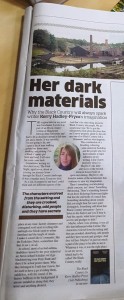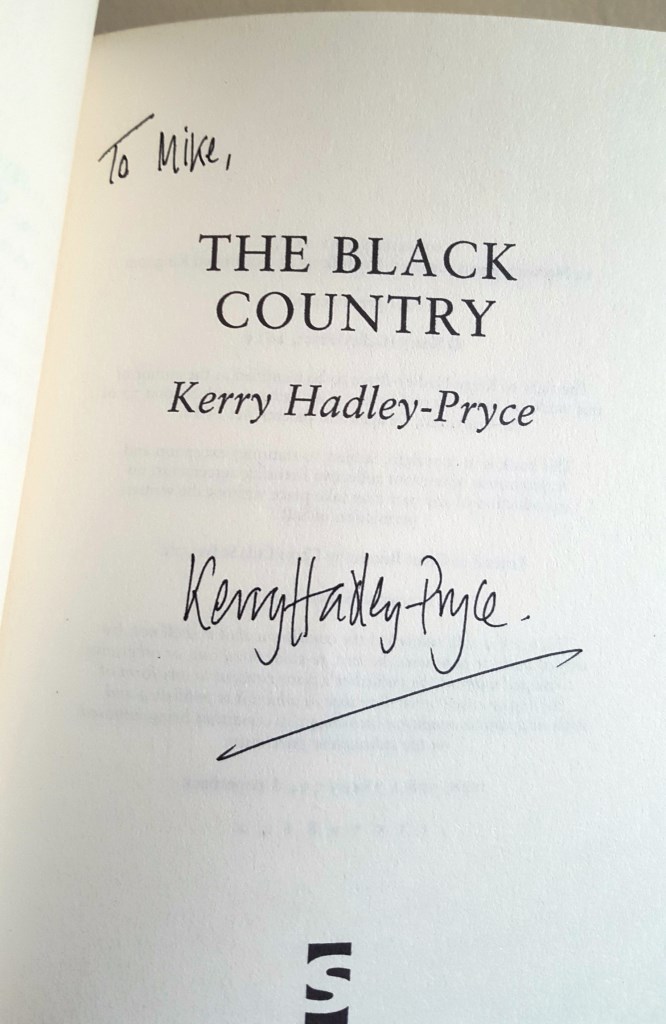As this post was written on Hallowe’en, it ‘s very appropriate that it’s about a rather flesh-creeping novel.
I’ve previously posted about my fellow MMU MA graduate, Kerry Hadley-Pryce’s, debut novel, The Black Country, when its publication was a few weeks away. Then I wrote about how I’d seen the novel develop during our course’s workshopping sessions in the first two years of the course.

So I couldn’t wait to get hold of the book and read how the final, published version compared with what I’d remembered. Amazingly, those workshop sessions were back in 2011 and 2012 — well over three years ago — the workshopping each others’ writing part of the course being in the spring term of the first two years.
Kerry has had some great reviews for The Black Country, including one in the Independent on Sunday and a piece on the Black Country (the geographical area, not the novel) written by Kerry herself that was published in the Metro — see photo on the left. As I know from observation on the 0744, the Metro shares its readership with many voracious consumers of novels so I hope this was a well-targeted piece of publicity.
I don’t think Kerry is a regular commuter herself, benefiting from what’s possibly a less frenetic working lifestyle in the Black Country. The day the Metro article was published she hadn’t actually managed to get hold of a physical copy of the paper.
Discarded on trains and tubes, copies of the newspaper disappear very quickly indeed, especially in London, where their dispense points are filled in the afternoon by the Evening Standard. However, I managed to save the day by finding a couple of spare copies left over in my local station, which were dispatched, post haste, up to the Black Country. Kerry kindly signed a copy of the novel for me in return.

I read the novel very quickly. That’s partly because it’s very concise (about 170 pages) and also because it’s difficult to put down. Having finished the novel I can’t add much to what I previously posted based on the sections I remembered from the course. To do so would risk giving away too many spoilers to those who take up my recommendation and buy the book.
I did, eventually, discover the identity of the narrator, which had been on of the most intriguing aspects of the novel during the course and one that Kerry had refused to reveal. I was certainly surprised when all became clear — and if I can be surprised after two years of reading and commenting on sections of the novel then I’m sure other readers will find the way the novel develops equally gripping.
As I’d hoped, reading the novel in the light of having read earlier drafts of substantial parts was a fascinating experience. I remembered some sections very clearly while, at least according to my memory, others had been reworked, with familiar passages appearing among what seemed to be new writing. Of course, the various aspects of editing are fundamental to the publishing process but it’s been a unique insight to compare memories of the original text with the printed book. It’s a testament to the quality of Kerry’s writing on the course that there are long passages that appear completely unchanged from the MA workshop sessions. There are many such passages of excellent, evocative prose, particularly describing the uniquely dour, post-industrial landscape of the Black Country itself.
Kerry’s biography states that she’s been teaching creative writing at secondary school level for a number of years and has also been writing herself for a considerable time. On reflection, perhaps The Black Country illustrates the experience she brought along to the MA course.
Whereas others may have started the course with the proverbial blank page and used the workshop sessions to experiment and shape the direction of their novels, I feel Kerry had a good idea at the outset of how and where she wanted to go with The Black Country, perhaps not in mechanical terms, such as the exact plot, but certainly with the tone, the characters of the protagonists and the identity of that narrator.
That confidence certainly seems to be in evidence in the published version of the novel — and was no doubt a major factor in Salt’s when they decision to buy the novel. From a creative writing MA perspective, The Black Country is an admirable piece of work — succinct and focused unerringly on what it wants to say and the innovative way it wants to say it — without a word wasted. I’m sure the MMU MA course and the input of the lecturers and other students was invaluable in helping Kerry hone and test her bold ideas.
I’d like to urge everyone to go out and buy a copy of The Black Country, although I do feel I should point out that, as the title suggests, its contents are rather on the dark side and, while bleak, psychological novels are currently popular, the novel definitely mines the more depraved aspects of the human condition
So many congratulations to Kerry to be the first of my writing friends whose work from a course has made it through to publication. I’m hoping I’ll see plenty more in the future.
